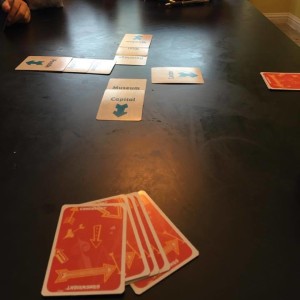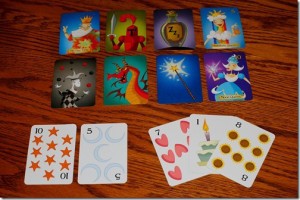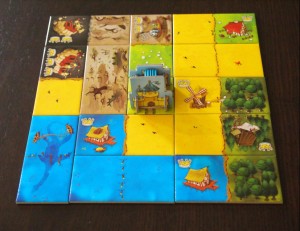This is a post about board games, but I do spend a little time contextualizing it so you can stick with the personal anecdote or jump straight down to the review bits. All games discussed in this post were purchased by me for personal use.
 When I first decided homeschooling was going to be a viable option for us I did a lot of research. I mean a lot of it. I read stacks of books on the condition of schools (public, private, and charter), homeschooling, unschooling and everything in between. I talked to other homeschooling parents. Some of them I knew and some that others referred me to. I chatted with folks online, met people for coffee, and met with folks while they were homeschooling their own kids. I needed to know something. I needed to know that there was a good way for me to do this. I wanted to do what was right for my child and to do what was going to prepare her for the future that she wants. So I ended up with something that is malleable, everchanging (but consistent), and a combination of homeschooling, unschooling, and the Indiana common core (you can ask me about that last part over drinks one day).
When I first decided homeschooling was going to be a viable option for us I did a lot of research. I mean a lot of it. I read stacks of books on the condition of schools (public, private, and charter), homeschooling, unschooling and everything in between. I talked to other homeschooling parents. Some of them I knew and some that others referred me to. I chatted with folks online, met people for coffee, and met with folks while they were homeschooling their own kids. I needed to know something. I needed to know that there was a good way for me to do this. I wanted to do what was right for my child and to do what was going to prepare her for the future that she wants. So I ended up with something that is malleable, everchanging (but consistent), and a combination of homeschooling, unschooling, and the Indiana common core (you can ask me about that last part over drinks one day).
One of the things that we did early (but admittedly sparingly) in our homeschooling was play games. And then I ran into a woman in one of my online gaming groups who was also a homeschooler who told me about gameschooling. Gameschooling. This notion sounded fascinating to me for a lot of reasons, not the least of which was the fact that it validated my desire to play more games at homeschool and reaffirmed what I already knew in my heart of hearts about what games can teach us. And that was kind of the beginning of the end. The elementary school teacher in me (afraid that never dies) made up a spreadsheet and started to map out how certain games and what skills they taught (with facilitation of course) and reinforced mapped onto the common core. I do this because it’s hard to shake my own educational training and at the same time I don’t want to be the next Black woman to be arrested for trying to homeschool her child. But I digress, I really just wanted to give you an update on how homeschooling has been going and to tell you all about some of the games that we have been playing.
 One thing that I learned from some other gameschooling parents is that resale and consignment shops are a great place to find games because building a good library of games can be expensive and it also makes it a little less painful when the new game that you’ve purchased turns out to be a total bust with the child playing it (and that has happened once or twice around here). But I digress, one of the games that I scored (still in the plastic) from a local resale shop was Gamewright’s card game In a Pickle. In a Pickle is a card game that asks you to think critically and creatively about the relationships between things. Players order cards in runs of 4 in a kind of relational order. Think: what relation might berries, birds, phone books, and universes have to one another? But you can’t just throw anything together and get away with it, another player can issue a challenge which means that you have to justify the order of things and that’s where the hilarity ensues. This game by itself is great, but I throw in a bit more creative fun and have the kids pick their favorite run of cards after the game is over and write a short “story” about it. It’s produced some great stories about berry filled birds flying around the universe fighting crime. In a Pickle was definitely one of my best accidental finds this semester.
One thing that I learned from some other gameschooling parents is that resale and consignment shops are a great place to find games because building a good library of games can be expensive and it also makes it a little less painful when the new game that you’ve purchased turns out to be a total bust with the child playing it (and that has happened once or twice around here). But I digress, one of the games that I scored (still in the plastic) from a local resale shop was Gamewright’s card game In a Pickle. In a Pickle is a card game that asks you to think critically and creatively about the relationships between things. Players order cards in runs of 4 in a kind of relational order. Think: what relation might berries, birds, phone books, and universes have to one another? But you can’t just throw anything together and get away with it, another player can issue a challenge which means that you have to justify the order of things and that’s where the hilarity ensues. This game by itself is great, but I throw in a bit more creative fun and have the kids pick their favorite run of cards after the game is over and write a short “story” about it. It’s produced some great stories about berry filled birds flying around the universe fighting crime. In a Pickle was definitely one of my best accidental finds this semester.
 Another thing that the kids have really loved this semester is math card games. We have played more Uno, Skip Bo, Sushi Go (I wrote about that one earlier) and Sleeping Queens than I care to admit. But Sleeping Queens is the game that I learned about from some other gameschoolers and the one that has been not only fun, but adaptable as a math game. Now this game is not without it’s problems narratively. Queens get put to sleep, awakened by kings, put back to sleep, stolen by knights, and protected by dragons…in short they have no agency of their own. While the game is great for making you think strategically about what moves you make and for making you think mathematically as you have to make and solve your own math problems using number cards in your hand in order to discard them, some of the more fruitful conversations that I’ve had with my kiddo have been in answer to “Why can’t the queens just wake themselves up?”. That has given us unforeseen opportunities to talk about chivalry and the lives of medieval women. Overall, the cards themselves are beautiful and the game is fun, but I’m already scheming on a way to give these queens a little more agency. Sleeping Queens is a game that can be fun for everyone! While it might be billed as a more educational game, the ability to stab other players in the back makes it a whole lot of fun for everyone!
Another thing that the kids have really loved this semester is math card games. We have played more Uno, Skip Bo, Sushi Go (I wrote about that one earlier) and Sleeping Queens than I care to admit. But Sleeping Queens is the game that I learned about from some other gameschoolers and the one that has been not only fun, but adaptable as a math game. Now this game is not without it’s problems narratively. Queens get put to sleep, awakened by kings, put back to sleep, stolen by knights, and protected by dragons…in short they have no agency of their own. While the game is great for making you think strategically about what moves you make and for making you think mathematically as you have to make and solve your own math problems using number cards in your hand in order to discard them, some of the more fruitful conversations that I’ve had with my kiddo have been in answer to “Why can’t the queens just wake themselves up?”. That has given us unforeseen opportunities to talk about chivalry and the lives of medieval women. Overall, the cards themselves are beautiful and the game is fun, but I’m already scheming on a way to give these queens a little more agency. Sleeping Queens is a game that can be fun for everyone! While it might be billed as a more educational game, the ability to stab other players in the back makes it a whole lot of fun for everyone!
 And the third (and last) game that I want to tell you about today was one of the (far too many) games I picked up during the Amazon board game sale, Kingdomino from Blue Orange Games. Kingdomino feels a little like Carcassone in that it is a strategic kingdom building game, but this one moves fast. The whole game is over in about 20 minutes of so and that the point at which you add up your points to see who the greatest land baron is. Each player is given a home tile and a little monarch meeple (we decided that the monarch could be a queen if the player holding it decided that this was the case) and you are them tasked with building your own kingdom of different terrains and that’s where the strategy comes in. You have to get as many tiles of the same kind together as possible in a 9×9 grid. The final scoring requires some math practice. In the end you have to multiply the number of terrain type tiles with the number of crown icons on those tiles to determine the number of victory points in that section. The player with the most victory points after all the scoring is done, wins. Kingdomino is a fun game that is easy for younger players to pick up, but still fun for the adults that play with them.
And the third (and last) game that I want to tell you about today was one of the (far too many) games I picked up during the Amazon board game sale, Kingdomino from Blue Orange Games. Kingdomino feels a little like Carcassone in that it is a strategic kingdom building game, but this one moves fast. The whole game is over in about 20 minutes of so and that the point at which you add up your points to see who the greatest land baron is. Each player is given a home tile and a little monarch meeple (we decided that the monarch could be a queen if the player holding it decided that this was the case) and you are them tasked with building your own kingdom of different terrains and that’s where the strategy comes in. You have to get as many tiles of the same kind together as possible in a 9×9 grid. The final scoring requires some math practice. In the end you have to multiply the number of terrain type tiles with the number of crown icons on those tiles to determine the number of victory points in that section. The player with the most victory points after all the scoring is done, wins. Kingdomino is a fun game that is easy for younger players to pick up, but still fun for the adults that play with them.
These three games are only a few of the many games that we’ve been playing in the last couple of weeks when we’ve been learning about castles, fortifications, zombies, and how diseases spread. And if you think long and hard about it you might be able to see the connections between those four things. All three of these games are games that I would recommend without hesitation. So as summer rolls around these are some titles that you might pick up to play with your kids on the days that are too hot for outdoor play or for a quick bit of gaming in the evenings. So have some fun and play (and learn) with your kids!




